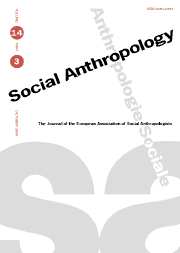Article contents
The future of social anthropology
Published online by Cambridge University Press: 03 June 2005
Abstract
What is the future of the disciplinary label ‘social anthropology’? The localised intellectual universes within which we carry out our early training as anthropologists are constantly penetrated and challenged by universal trends. At the same time, due to their relative independence, these local intellectual universes play an important role as spaces where intellectual reproduction can carry on in relative independence from the global hegemonic voices. In this paper I argue for a more complex approach to the concept of ‘alterity’, claiming that the constant discourse of self-accusation concerning anthropology's past and its essential ‘westernness’ hides the complexity of the interactions that went into the construction of the anthropological cannon which we are today reproducing globally. Today's anthropology has become increasingly symmetrical.
Quel sera le futur de la discipline appelée ‘anthropologie sociale’? Les univers intellectuels localisés au sein desquels nous recevons nos premières formations à l'anthropologie sont constamment pénétrés et remis en question par des courants universels. Dans le même temps, en raison de leur indépendance relative, ces univers intellectuels locaux jouent un rôle important en tant qu'espace où la reproduction intellectuelle peut se poursuivre en relative indépendance vis-à-vis des paroles hégémoniques globales. Dans cet article, je défendrai une approche plus complexe du concept ‘d’ altérité', en soutenant que le discours ininterrompu d'auto-accusation à propos du passé de l'anthropologie et de son ‘occidentalisme’ essentiel cache le complexité des interactions qui ont contribué à la construction des canons anthropologiques qui sont aujourd'hui mondialement reproduits. L'anthropologie contemporaine est devenue encore plus symétrique.
Wie sieht die Zukunft der Fachbezeichnung ‘Sozialanthropologie’ aus? Die lokalisierten intellektuellen Sphären, in denen wir unsere frühe Ausbildung zu Anthropologen durchlaufen, werden ständig von universellen Trends durchdrungen und in Frage gestellt. Gleichzeitig ermöglicht jedoch die relative Unabhängigkeit dieser lokalen akademischen Domänen eine intellektuelle Weiterentwicklung, dei von globalen Hegemonieansprüchen relativ unbeeinflusst bleibt. In diesem Papiere fordere ich zu einer komplexeren Annäherung an das Konzept ‘Alterität’ auf. Ich behaupte, dass der andauernd selbstbezichtigende Diskurs betreffend der Geschichte des Faches so wie seine essenzielle Eigenschaft, ‘Teil der westlichen Welt’ auszumachen, die Komplexität der Vorgänge überschattet, die zur Konstruktion des anthropologischen Kanons, so wie er heutzutage global reproduziert wird, geführt haben. Die heutige Anthropologie ist zunehmend symmetrisch geworden.
¿Cuál es el futuro de la disciplina llamada ‘antropología social’? Los universos intelectuales locales dentro de los que aprendemos a ser antropólogos, se encuentran continuamente bajo acecho e influencia de tendencias universales. Al mismo tiempo, estos universos intelectuales locales juegan un papel importante como espacios donde la reproducción intelectual puede comunicarse con relativa independencia de las voces globales hegemónicas. En este ensayo, intento construir un acercamiento más complejo al concepto de ‘alteridad’, argumentando que el discurso constante de auto-acusación de los antropólogos sobre el pasado de la disciplina, y su esencial ‘naturaleza occidental’ esconden la complejidad de las interacciones que forjaron el canon antropológico que hoy en día reproducimos globalmente. La antropología actual es cada vez más simétrica.
- Type
- Research Article
- Information
- Copyright
- © Cambridge University Press 2005
- 6
- Cited by




